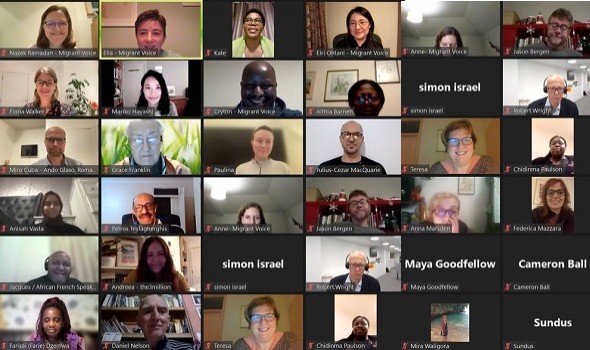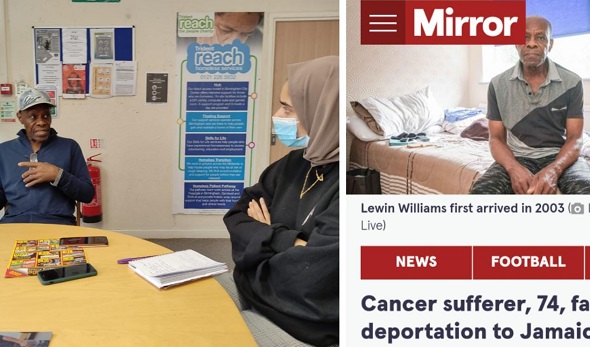Our voices have the power to bring change: Reflections from our roundtable event
Our voices have the power to bring change: Reflections from our roundtable event

FRIDAY 17 DECEMBER
Migrant Voice marked this year’s International Migrants Day with a panel discussion, ‘Raising our game? Challenges and opportunities for migrants to speak out in the media’ on 14 December 2021.
With an expert panel made up of Migrant Voice Ambassadors and a group of journalists with a track record of bringing migrant voices to the centre of their reporting, our members had a robust and, at times, challenging discussion on migrants’ engagement with the media and where to go from here.
The journalists on the panel were unanimous in their commitment to enabling migrants’ real voices to be heard and giving much-needed visibility to people who have been failed by the system. Fiona Walker, former Reporter at BBC Scotland said, "People need to have a voice, they need to speak for themselves", and this determination was echoed by all the journalists on the panel.
There is, at the same time, undeniable weariness among some migrants when the idea of speaking to the media is mooted. Mariko Hayashi, Migrant Voice Ambassador, pointed out that "the angle of stories (in which our voice is used) is very important for us, especially when we are advocating for our rights as migrants."
Mariko explained that often we have little control over the way our voice is framed in the final piece. There is also a perception that some journalists have already decided how to frame their piece even before contacting migrants for their input: they are simply looking for case studies of or quotes from migrants which will give their framing legitimacy, instead of co-producing the narrative with migrants as equal partners.
Simon Israel, former Senior Home Affairs Correspondent at Channel4 News, also observed this tension. He has recently taken up the role of Media Advisor at Migrant Voice, and through his interaction with our members he noticed that "there is an awful lot of talent that surrounds Migrant Voice in terms of people and the stories they have.” But he added: "There is also an overriding concern of safety, security and individuals’ own welfare. Part of my role is to try and bridge that concern."
Simon and other journalists reiterated throughout that they write to bring about positive outcomes for the migrants whose stories they cover. At the same time, we heard that the journalists also need to fight, sometimes very hard, for the type of stories they want to write to be commissioned by their editors.
The discussion also revealed the inevitable tension that exists between journalists’ need to adhere to professional standards and deal with increasing pressure to meet tighter deadlines, and migrants’ desire to tell their side of the story to further their cause.
Robert Wright, Social Policy Correspondent for the Financial Times explained why, in his role as a journalist, he "needs to ask difficult questions" to migrants, for example, to establish accuracy of the information offered and really understand what has happened. He said: "We want to help migrants," but added that his "primary responsibility is to readers." He needs to engage with how readers view the world - their paradigm - which might not align with that of migrants’ or migration NGOs.
A key discussion was around the importance of a human angle to a story. While anonymity might offer more reliable protection, some of the journalists present explained that their request for migrants' personal details is driven by their motivation to humanise people, that having photos and names help to demonstrate that migrants are real people. In one panellist’s words: "For a story to hit home, it needs to have an emotional impact." For some migrants, however, there is a question mark over where humanising ends and commodification of migrant ‘case studies’ starts. Where ‘case studies’ are simply portrayed as sensational, individualised, stories, which fail to address the structural causes of systemic exploitation, scapegoating and violence against migrants. The big question is how do we tell stories that address the needed structural changes?
A question that prompted a particularly lively exchange was: "What makes a story?" Sometimes migrants are left feeling that the issues that matter greatly to them are not picked up by the media early enough, and that by the time the story finally hits the news, it has already caused untold damage to our communities. Fluidity and the unpredictability of news cycles were highlighted as factors in this. Another big factor was whether from the editors’ (and not the journalists’) point of view, these stories matter to their readers and are worth commissioning.
Finally, an additional factor could be whether a shared, compelling narrative - of what is happening, why and what is its impact - already exists among the migrants themselves and is ready to be told.
Looking ahead, Anisah Vasta, a journalist at Birmingham Live, highlighted the vital importance of local media that is embedded in a local context and whose stories have the potential to go national. As an example of community reporting, Anisah shared her work covering Migrant Voice member Lewin Williams' campaign which has so far gathered over 78,000 signatures of support. Lewin is battling cancer and will not be able to afford treatment if deported. Anisah said: “He is up against a system that is set up to play against him." This story was later picked up by The Voice and The Mirror, among others. Anisah also reminded everyone of the importance of having a diversity of stories covering migrants and migration. She said: "A migrant having a success story is just as interesting as someone going through hardship."

Miro Cuba, a Migrant Voice Ambassador based in Glasgow, pointed out that the media’s attention to the fate of EU citizens has waned since Brexit, but they continue to face many challenges. Miro highlighted some of the concerns, including a situation “like the Windrush scandal, that can also happen to the EU settlement scheme, so out of the blue we can lose our Indefinite Leave to Remain and work permit in the UK.”
Miro suggested that more stories were needed on the issues faced by EU nationals but fundamentally, he said, we need more stories about the common ground. “We should be fighting for workers’ rights from any country…Find commonalities between different migrants and also between migrants and non-migrants,” he said. “Because at the end of the day the issues we’re fighting here are shared rights. It’s working rights that’s the problem, not just for migrants, it’s a problem of government policies. So I see this kind of angle [as] potential ground for getting better public opinion about migration when they see that they actually share something with the migrants.”
Cryton Chikoko, Migrant Voice Ambassador, who has recently joined the MV staff team in Glasgow, said that he absolutely thinks it’s worth speaking to the media. He said: “Your voice, our voice is important, and must be heard…The media gives us opportunities not only to showcase who we are as migrants but also to have a go at oppressive laws. I strongly believe that our voices as migrants have the power to bring change.”
Cryton said that it is a good thing about the UK that you can speak up and explained that he recently supported a former care home manager to tell her story in the media. Afterwards she felt so relieved for having spoken out, even though her circumstances didn’t change. Cryton concluded: “I believe we all have stories to tell. There are many people here and at Migrant Voice who can support us telling our stories. An asylum seeker whom I spoke to last week said: ‘He who feels it, knows it best.’ So, we need to tell our stories.”


